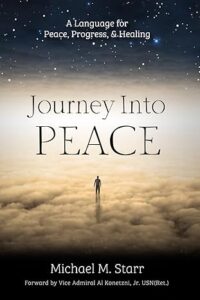Michael M. Starr, author of “Journey into Peace,” discusses the transformative power of language with host Myrna on The Transform Your Mind Podcast. They explore how everyday language impacts thinking and perception, potentially fostering peace or conflict. Michael introduces concepts like “the language of victimhood” and shares insights from his book to enhance personal and relational well-being. Discover how understanding others and redefining language can dissolve barriers and empower change. Michael’s work emphasizes empathy, compassion, and responsibility as keys to progress and healing.
Download the podcast here:
Key Takeaways:
-
Understanding and empathy are critical in transforming relationships and resolving conflicts.
-
The power of Language shapes our perception and can be a tool for self-fulfilling prophecies.
-
Personal empowerment through improved communication can lead to significant personal and professional growth.
Building connections through effective communication is an age-old quest, yet many of us still stumble upon barriers when real-life challenges emerge. In a compelling conversation between Myrna and Michael M. Starr, author of Journey Into Peace: A Language for Peace, Progress, and Healing, we explore the transformative power of language and how it can lead to greater harmony and success in our lives. Let’s delve into the critical insights that were shared in the discussion, unveiling the profound impact of “betterism” and the wise use of language.
Harnessing the Power of Language for Empathy and Understanding
Empathy is often seen as a soft skill, yet Michael M. Starr emphasizes its sheer strength as a transformational force. One anecdote stands out—the story of Daryl Davis, a Black musician who successfully befriended members of the Ku Klux Klan. This example illustrates how empathy and understanding can lead to groundbreaking change. As Michael shares, “Relationship listening… to try to understand why people think the way they do… influenced over 200 clansmen to disavow their membership.”
By shifting perception from labeling others negatively to approaching them with an open mind, individuals can peacefully confront prejudices and foster positive change. This powerful concept suggests that understanding, rather than condemning, leads to not only personal empowerment but to societal progress as well.
Deconstructing Language: Avoiding Self-Fulfilling Prophecies
Language is a double-edged sword—it can elevate us or confine us. Michael identifies three types of language: dangerous, useless, and wise empowering. By becoming aware of how our language shapes our thinking, we can shift from victimhood to active agency. Dangerous language, such as assigning blame (“you made me do this”), gives away our personal power. Meanwhile, Michael argues that words like “forgiveness” fall into the useless category, serving as platitudes without actionable guidance.
Instead, wise empowering language propels us forward. “If it’s to be, it’s up to me,” Michael states, underscoring personal responsibility. Through conscious language, we attain peace, progress, and healing, reframing narrative myths into pathways of potential.
Book: Journey into Peace
The Role of Betterism: A Framework for Self-Improvement
Betterism—a uniquely coined term introduced by Michael—emphasizes incremental progress through introspection and compassionate communication. It encourages a lifestyle that focuses on seeking more good and less bad via personal responsibility. “The journey be a healthy journey and the destination is a wise destination,” Michael elaborates, noting the integration of integrity, relationships, and health.
By aligning goals with “betterism,” individuals create a harmonious existence, free from regret. “Climbing the ladder of success” becomes more than just reaching the top. It signifies a meaningful ascent with preserved relationships and well-being intact. Through mindful communication and the practice of betterism, personal and professional transformations become attainable objectives.
Michael M. Starr‘s dialogue with Myrna serves as a reminder of the power of language’s dynamic role in shaping our realities. By focusing on empathy, understanding, and a conscious choice of words, individuals hold the keys to unlock richer, more rewarding interactions, ultimately leading to personal growth and societal harmony. Through the lens of “betterism,” we’re empowered to navigate life with increased intentionality and connection, transforming challenges into opportunities for greater peace and ongoing progress.









